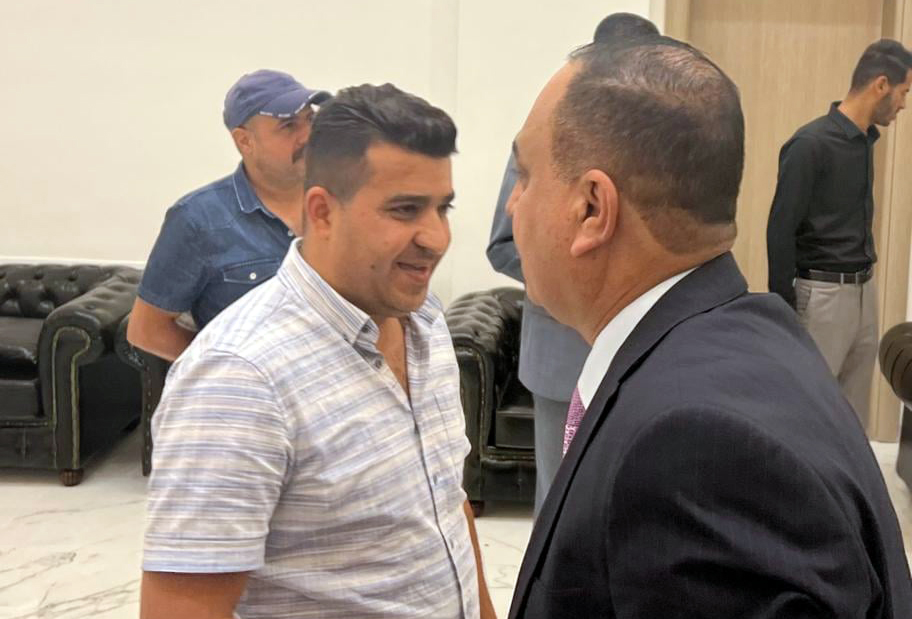Kirkuk was ranked the second among the Iraq provinces in terms violations against journalists during 2021 following Baghdad which took the lead and ahead of Erbil ranked the third according to the annual report of a local organization that defends freedom of speech and press.
The report, published on December 26th 2021, of which KirkukNow obtained a copy, touched on the violations documented in the period from January 1, throughout December 25, total 233 violations throughout Iraq.
It was prepared by Press Freedom Advocacy Association in Iraq, a group of Iraqi journalists and media professionals defend freedom of opinion, monitor violations against journalists and media workers and work to develop journalism and media in Iraq.
The violations recorded by the association included 139 cases of physical abuse and prevention of media coverage, one assassination attempt, one kidnapping case, 34 cases of arrest and detention, 15 cases of closing channels and arbitrary dismissal of employees, and 13 cases of journalists injured while performing their journalistic duties.
According to the report, most of the violations were recorded during the month of November, which coincided with the student protests in the Kurdistan region of Iraq, where 40 cases of abuse against journalists were recorded.
The capital Baghdad was ranked first, with 66 violations, followed by Kirkuk with 35 cases, Erbil with 28 cases, Basra with 20 cases and Sulaymaniyah with 18 violations, while Ninewa came seventh with 15 violations.
Since the US led invasion in 2003, over 470 journalists and media workers have been killed in Iraq, according to Iraqi Journalists’ Syndicate IJS, many of them having been assassinated, the International Federation of Journalists said. There are no records of the Iraqi authorities bringing those responsible to justice.
The figures by the New York-based Committee to Protect Journalists CPJ about attacks against journalists in Iraq shows that 2 journalists were killed, three were imprisoned and nine went missing in 2020 compared to four imprisoned and nine missing in 2021.
Baghdad came first with 66 cases of violations, followed by Kirkuk with 35 cases, and Erbil in third place with 28 cases
The report by the Iraqi organization indicated that on January 20, a security officer of state-run Kirkuk Oil Company prevented Karwan Salihi, correspondent of KirkukNow, and Ozen Ramadan, correspondent of the Turkish Anadolu Agency, from covering protests by university and institute students demanding appointment.
The report also indicated that "the security forces in Kirkuk arrested on September 4, five journalists while covering security events in a village of Sargaran sub-district in the Dibs district of Kirkuk."
The five journalists were reporters of Turkish Anadolu Agency Ozen Muhammad, its cameraman Hisham Muhammad, NRT correspondent Diyar Muhammed and its cameraman Ali Baghdadi, and Kirkuk TV reporter Youssef Murad. They were released following two hours of detention.
The report declared that on November 1, the director general of Kirkuk Education, Abdul Ali Hussein, prevented the crews of KirkukNow, Al-Iraqiya TV, Gali Kurdistan TV, Kirkuk TV, and Anadolu Agency from covering the celebration of the of the new academic year in one of the Kirkuk’s schools, as the Director of Education "expelled the journalists and verbally reproached them."

Abd Ali Touma, Director General of Kirkuk Education, apologizes to Kirkuk Now reporter Karwan Salihi for his expulsion from a primary school while covering the ceremony of new academic year on November 1st. Media department of Kirkuk Governorate Administration
"It is noted by monitoring violations throughout 2021 that the risks continue and the level of freedom of the press had declined throughout Iraq, especially in the Kurdistan region, which was considered a safe area for journalists fleeing from their areas at the time of the threat of armed groups after the October 2019 protests," the report concludes.
The association stressed the need to reconsider the necessary steps to be taken regarding freedom of the press in Iraq.
The report also noted the existence of "a deafening silence, indicating a political mood seeking to narrow the spaces for freedom of expression and the press, through the high incidence of bans on filming and press coverage of various events in the country."
The report concluded by noting that “the absence of real measures by the Commander-in-Chief of the Armed Forces or the Minister of Interior or joint operations to improve the performance and interaction of security forces with journalists, also indicates a level of acceptance by the authorities of continued repression, detention and prevention, for the lack of a growing journalistic influence, and the establishment of the fourth power, which is one of the tools of a true democratic system."




